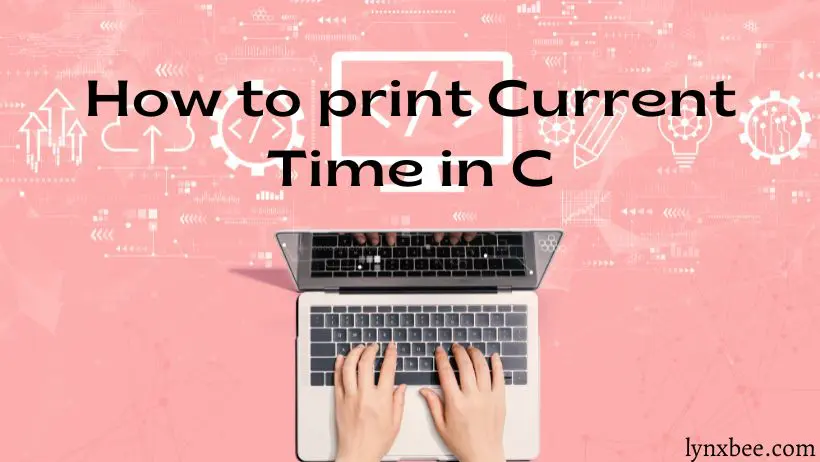Printing the current time in C is a common requirement when developing applications that need time tracking, logging events, or performing actions at scheduled intervals. The C Standard Library provides functions that allow you to easily retrieve and display the current date and time. This guide will walk you through how to print the current time in C, from the basic syntax to troubleshooting common issues that may arise during implementation.
By the end of this post, you will have a comprehensive understanding of how to use C to print the current time, along with best practices and solutions for common pitfalls.
What is Printing Current Time in C?
In C programming, printing the current time involves retrieving the system time and formatting it in a human-readable way. The time.h library provides several functions that make this possible, including time(), localtime(), and strftime().
- Key Functions:
time(): Returns the current time in seconds since the Epoch (January 1, 1970).localtime(): Converts the time to a structure containing calendar date and time.strftime(): Formats the time according to the specified format.
Example: You can use these functions to display the current date and time as YYYY-MM-DD HH:MM:SS.
How to Print the Current Time in C
To print the current time, you’ll need to use a combination of functions from the time.h library. Below is an example of how you can achieve this.
Basic Example of Printing Current Time
The following program demonstrates how to print the current time in C:
#include <stdio.h>
#include <time.h>
int main() {
time_t currentTime;
struct tm *localTime;
char timeString[100];
// Get the current time
time(¤tTime);
localTime = localtime(¤tTime);
// Format the time as YYYY-MM-DD HH:MM:SS
strftime(timeString, sizeof(timeString), "%Y-%m-%d %H:%M:%S", localTime);
printf("Current Time: %s\n", timeString);
return 0;
}- Explanation:
time_t currentTime: A variable that stores the current time in seconds since the Epoch.time(¤tTime): Retrieves the current system time.localtime(¤tTime): Converts the system time into a human-readable form.strftime(timeString, sizeof(timeString), "%Y-%m-%d %H:%M:%S", localTime): Formats the time into a string.
How the Time Functions Work
The process of printing the current time involves using time() to retrieve the system time and localtime() to convert it to local time. Finally, strftime() is used to format the date and time into a string for easy output.
time(time_t *timer): Gets the current time in seconds since January 1, 1970.localtime(const time_t *timer): Converts the time from seconds to a structure with individual components (year, month, day, hour, etc.).strftime(char *str, size_t maxsize, const char *format, const struct tm *timeptr): Formats the time according to a specified format.
Common Format Specifiers:
%Y: Year with century (e.g., 2024).%m: Month as a number (01-12).%d: Day of the month (01-31).%H: Hour (00-23).%M: Minute (00-59).%S: Second (00-59).
Setting Up Your Project to Print the Current Time
- Include Required Headers: Use
#include <time.h>for time-related functions and#include <stdio.h>for standard I/O. - Create a Time Variable: Use
time_tto store the current time. - Format the Time for Output: Use
strftime()to convert the time structure into a readable string format. - Compile and Run: Use GCC or any C compiler to compile and run your code.
# Compile and Run
gcc -o current_time current_time.c
./current_timeCommon Issues and Solutions When Printing Current Time
1. Incorrect Time Displayed
The time displayed might not be accurate if your system time settings are incorrect or not synchronized.
Solution: Ensure your system clock is set correctly and synchronized with a time server.
2. Buffer Overflow in strftime()
If the buffer passed to strftime() is too small, it can cause undefined behavior or a buffer overflow.
Solution: Ensure that the buffer size is large enough to store the formatted time string. A size of 100 bytes is generally sufficient.
char timeString[100]; // Allocate enough space for the formatted string3. Time Not in Local Time Zone
If you notice that the printed time is in a different time zone, it could be due to the localtime() function not correctly adjusting for your local time zone.
Solution: Make sure your system environment variables for the time zone are set correctly.
Best Practices for Printing Current Time in C
- Use a Sufficient Buffer: Always allocate enough memory for the buffer passed to
strftime(). - Error Handling: Use proper error handling for
time()andlocaltime()to catch any failures. - Format the Output: Use
strftime()to format the time in a way that is easy to read for users. - Use Local Time When Needed: Depending on your application, use either
localtime()orgmtime()to get local or UTC time, respectively.
How to Enhance Your C Program with Current Time
- Add Date Stamps to Logs: Incorporate current time stamps in logging systems to track events effectively.
- Create Time-Based Reports: Use current time to generate reports based on user actions or events.
- Use UTC Time for Global Applications: If you are developing software used globally, consider using
gmtime()to print UTC time.
Example of Using UTC Time
#include <stdio.h>
#include <time.h>
int main() {
time_t currentTime;
struct tm *utcTime;
char timeString[100];
time(¤tTime);
utcTime = gmtime(¤tTime);
strftime(timeString, sizeof(timeString), "%Y-%m-%d %H:%M:%S", utcTime);
printf("Current UTC Time: %s\n", timeString);
return 0;
}Conclusion
Printing the current time in C is a fundamental aspect of many applications, such as logging, tracking events, and scheduling tasks. By using functions like time(), localtime(), and strftime(), you can easily retrieve and format the current system time. Understanding how to work with time in C allows you to create more interactive and efficient programs.
By following the guidelines and examples provided in this guide, you should now have a thorough understanding of how to print the current time in C confidently and handle any potential pitfalls that may arise.
